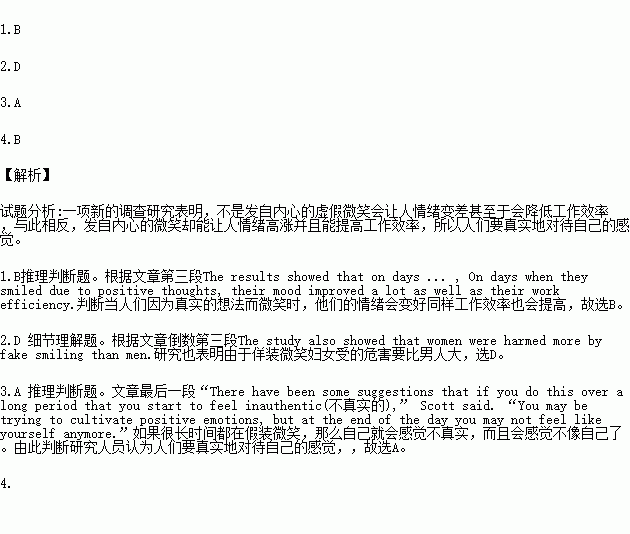题目内容
Exhausted and unhappy, you still have to squeeze a smile to your friends, or teachers. That’s just life, you may think. But new research suggests that putting on a fake smile can worsen people’s mood and even lower work efficiency.
Lead researcher Brent Scott with other researchers studied a group of bus drivers for two weeks. They tried to find out what happened when the drivers were involved in “surface acting” or fake smiling, and the opposite, “deep acting” which means people put on real smiles by recalling pleasant memories or thinking about their current situation more positively.
The results showed that on days when drivers were forced to smile, they felt depressed and didn’t want to work. On days when they smiled due to positive thoughts, their mood improved a lot as well as their work efficiency.
The research goes against the popular belief among companies that employees should be cheerful to customers at all times. They include employees of shops, banks, call center workers and others who have face-to-face contact with members of the public. “Smiling for the sake of(为了) smiling can lead to emotional exhaustion and coldness, and that’s bad for the organization,” Scott told the Daily Mail.
The study also showed that women were harmed more by fake smiling than men. Their mood and work performance both worsened more. But they were helped more by deep acting — their mood became better and they worked more efficiently.
However, while deep acting seemed to improve mood in the short term, Scott says it’s not a long-term solution for unhappiness.
“There have been some suggestions that if you do this over a long period that you start to feel inauthentic(不真实的),” Scott said. “You may be trying to cultivate positive emotions, but at the end of the day you may not feel like yourself anymore.”
1.Brent Scott and others’ experiments on bus drivers suggest that ______.
A. depression among bus drivers is common
B. thinking in a positive way helps with work efficiency
C. bus drivers with pleasant memories tend to be less efficient
D. the bus drivers’ work efficiency is determined by their mood
2.According to the article, which of the following statements about “fake smiling” is TRUE?
A. It is good for the business but bad for the employees.
B. It doesn’t work on people who are emotionally expressive.
C. It is a widely accepted cultural practice in the US.
D. It causes more harm to women than men.
3.We can conclude from the article that the researchers think that ______.
A. people should be true to their feelings
B. smiling helps to put people in a good mood and become more efficient
C. it is unnecessary to cultivate positive emotions
D. deep acting can improve mood in the long run
4.The article is mainly about ______.
A. the importance of smiling during face-to-face contact
B. a new study on fake smiling and its influence on people
C. suggestions on improving work efficiency
D. how to cheer up when you are exhausted
假设你是育才中学学生会主席李华。你校将举办一次英语演讲比赛 (speech contest).希望附近某大学的外籍教师Smith女士来做评委。请参照以下比赛通知给她写一封信。
英语演讲比赛 主题:人与自然 时间:6月15日下午2:00-5:00 地点:501教室 参赛选手:10名学生 联系人:李华(电话44876655) 欢迎大家光临 |
注意:词数100左右。
【写作指导】内容要点:一、自我介绍; 二、邀请做评委; 三、演讲主题;
四、 比赛时间; 五、参赛选手; 六、联系方式。
注:信中无需出现比赛地点,但写出亦不扣分。
Dear Ms. Smith,
_____________________________________________________________________________
_____________________________________________________________________________
_____________________________________________________________________________
With best wishes,
Li Hua

